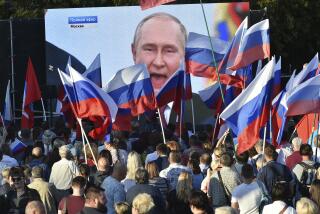Moscow’s Youth Movement
- Share via
For several years now the world has been waiting for a new generation of leaders to take over in Moscow, wondering whether that change, when it came, would lead to a new era of better relations between East and West. With the death of Konstantin U. Chernenko and the naming of Mikhail S. Gorbachev to take his place in the Kremlin, the West is about to start finding out.
President Reagan struck the right note with his statement expressing hope for improved U.S.-Soviet relations, and particularly for reductions in the levels of nuclear arms, but reminding people that Moscow is run by a collective leadership whose policies may be slow to change.
The fact that the strategic arms talks are going ahead today as scheduled, even before Chernenko is interred, is a good sign. It confirms that the Soviet decision to return to arms-control negotiations is unchanged by Chernenko’s passing.
Chernenko, who died Sunday at 73 of complications from emphysema, served only 13 months at the pinnacle of power. Inside and outside the Soviet Union he was looked on as an interim, hold-the-fort representative of the Politburo’s older members who were reluctant to relinquish power to younger men. But now the shift is under way.
At 54 Gorbachev is the youngest member of the Politburo--which means that he could well be around at the turn of the century.
The new Kremlin leader inherits a Soviet Union that is powerful beyond the wildest dreams of the czars, but that is also a country in trouble. Economic growth continues to taper off. Food production is chronically short. Soviet industry is falling behind in computer-age technology.
Soviet-style Marxism has lost its appeal both at home and abroad. The invasion of Afghanistan and Soviet bullying in Western Europe have undercut the effectiveness of Soviet foreign policy. The only thing that the system is doing well is producing ever-growing mountains of expensive arms.
Most Western experts agree that the big need is for a loosening of centralized controls over the economy; so far, however, the ruling elite has been unwilling to risk the erosion of political control that might be a byproduct of reform. The old leaders have also been unwilling to shift resources from defense to the civilian economy.
Gorbachev--who brings a suave, sophisticated touch to Soviet leadership--is seen by many people inside and outside the Soviet Union as a champion of pragmatic change. But even if this reading is correct, it would be a mistake to expect much to happen in a hurry--especially in the realm of foreign policy, in which he has little experience.
Soviet leaders are not free agents. Important decisions require a consensus of the Politburo, which reflects such powerful constituencies as the military-industrial complex, the security apparatus and the party bureaucracy. Politburo members are darkly suspicious of changes that might imperil their own power, perks and sources of patronage.
The late Leonid I. Brezhnev required a decade to get his own ruling team into place. The pace of change under Chernenko and his predecessor, Yuri V. Andropov, was glacial--and not always in the right direction. Police-state controls are tighter in many respects now than during the 1960s, and Soviet global behavior is still threatening.
It is reasonable to hope that Gorbachev’s move to the top will ultimately make a difference. But the old men are still around--and will be for a few years to come. In any event members of the up-and-coming leadership generation have been through the same conditioning process as their elders in a system that rewards conformity more than bold, imaginative thinking.
It is even possible that the Gorbachev generation could turn out to be more nationalistic and harder to get along with than its predecessors, because it is not burdened with memories of the horrors of World War II.
The truth is that East-West tensions arise not from some easily repaired misunderstanding or breakdown in communication, but from competing national interests and fundamentally different ideas as to the nature of people and human freedom.
That doesn’t change the fact that we share the same planet and, in the nuclear age, must find peaceful means of resolving or at least living with our differences. The U.S. and other Western governments should make it clear that the door is open to a genuine, live-and-let-live brand of peaceful coexistence. Reagan, especially, should be sensitive to any encouraging overtures. Realistically, however, Americans should understand that fundamental changes in Soviet behavior, if they come at all, will probably come very slowly.
More to Read
Sign up for Essential California
The most important California stories and recommendations in your inbox every morning.
You may occasionally receive promotional content from the Los Angeles Times.













